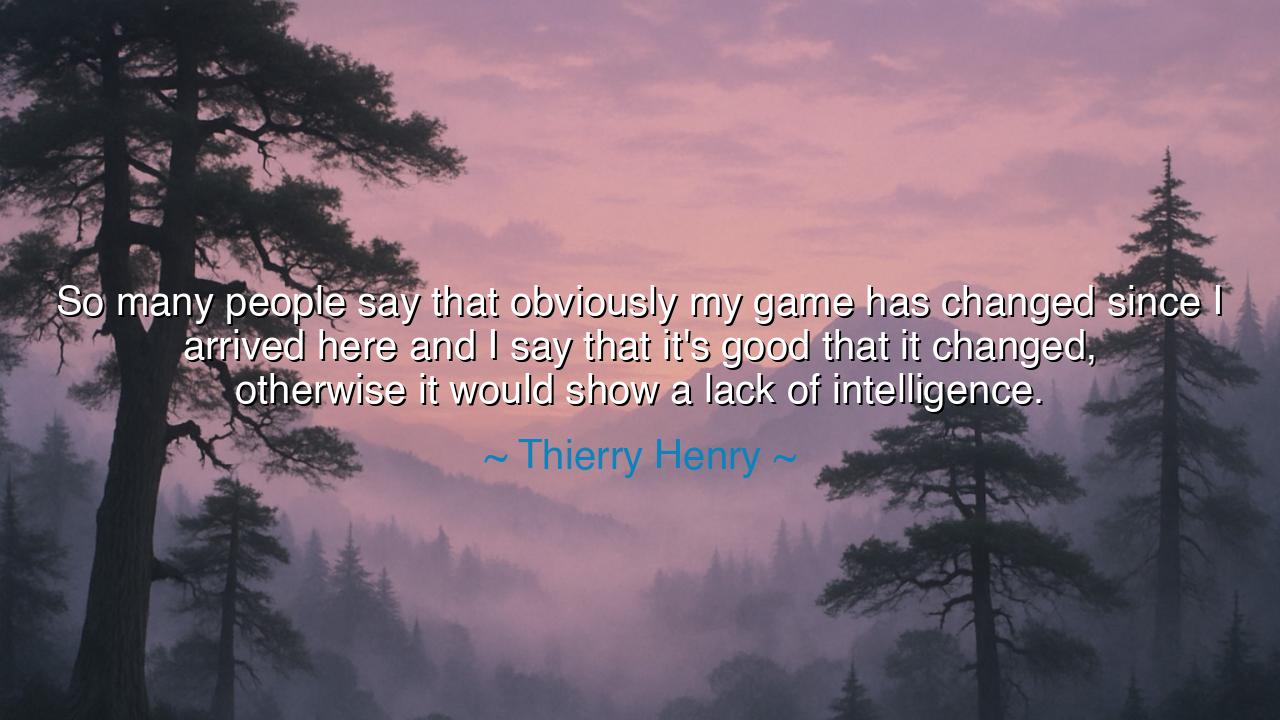
So many people say that obviously my game has changed since I
So many people say that obviously my game has changed since I arrived here and I say that it's good that it changed, otherwise it would show a lack of intelligence.






“So many people say that obviously my game has changed since I arrived here, and I say that it’s good that it changed, otherwise it would show a lack of intelligence.” Thus spoke Thierry Henry, the master craftsman of the beautiful game, whose feet moved with poetry and whose mind, even more than his body, defined his greatness. His words are not merely about football — they are about growth, about the sacred art of adaptation, and about the wisdom that lies in transformation. In these words, Henry reveals the eternal truth that intelligence is not the preservation of the old, but the evolution of the self.
When Henry speaks of change, he speaks as one who has lived it. From his early days as a fiery winger in France to his years of glory at Arsenal, and later his reinvention at Barcelona, he learned that brilliance is not static — it is a living flame that must move, bend, and reshape itself lest it die. In England, he became a goal-scorer of mythic proportions; in Spain, he became a servant of the system, learning to pass, to sacrifice, to serve something greater than his own glory. Many wondered why the artist who once painted goals with his feet now played more humbly, more subtly. His answer was simple and profound: it was intelligence, not decline, that guided him.
For change is the truest measure of the mind’s vitality. The one who refuses to evolve clings to yesterday’s triumphs, like a warrior polishing a sword in an age of gunpowder. Henry’s insight echoes the wisdom of the ancients — for did not Heraclitus, the philosopher of flux, say that no man ever steps into the same river twice? The river changes, and so must the man. To resist change is to resist life itself, for all things that live are in motion. The tree bends with the wind and survives; the rigid trunk breaks. Thus, the player who changes his game, the artist who reinvents his craft, the thinker who refines his ideas — these are the truly intelligent, for they live in harmony with the flow of time.
This lesson extends beyond the field of play. Consider Leonardo da Vinci, whose genius did not remain confined to one art or one science. He painted, designed, studied anatomy, dreamed of flying machines — always learning, always transforming. Had he insisted upon being only a painter, the world would have lost a universe of invention. So too with Henry: he saw that mastery demands humility before the new. Intelligence is not pride in what we know, but openness to what we can still learn. Every era, every environment demands something different — from the athlete, the artist, and the soul itself.
Yet many fear change, mistaking it for betrayal of identity. They wish to remain who they were, not realizing that to remain unchanged is to wither. Henry’s words remind us that adaptation is not weakness, but strength refined by wisdom. The river does not apologize for flowing; the flame does not regret that it flickers differently in the wind. When he says that failing to change would show “a lack of intelligence,” he is teaching that to cling to one’s past form is to deny one’s present reality. The truly wise do not fight the transformation — they shape it, they evolve with grace, turning necessity into art.
There is a noble humility in Henry’s philosophy, for it teaches that no man is ever complete. His greatness did not lie only in the goals he scored, but in his willingness to evolve — to become the student again, even at the height of his fame. In every craft, whether in sport, music, leadership, or love, this same truth holds: intelligence is not perfection, but perception — the ability to see what must change before it becomes too late to change it. The stagnant mind decays, but the learning mind renews itself endlessly.
Therefore, O seeker of wisdom, take this lesson to heart: change is the language of the intelligent. When life demands a new rhythm, do not resist — listen, adapt, and grow. Do not be ashamed to shift your game, to reimagine your path, to leave behind what no longer serves your becoming. For intelligence is not the memory of the past, but the movement toward the future. Let your work, your art, your very being evolve as the seasons do — and in that evolution, you will find not the loss of self, but its perfection.
So remember the teaching of Thierry Henry: to change is not to abandon your essence — it is to refine it, to rise higher through understanding, to master the art of transformation. For only the foolish cling to what was, while the wise embrace what may yet be. And thus, as the player changes his game to meet the field before him, so must we all change our ways to meet the world as it unfolds — with intelligence, grace, and courage.






AAdministratorAdministrator
Welcome, honored guests. Please leave a comment, we will respond soon